Thousands of demonstrators took to the streets of London last Saturday (August 9), honoring the call for a global “day of rage” in response to the ongoing Israeli atrocities in Gaza. The organizers estimate that 150,000 protesters attended, making it the biggest Gaza-solidarity demonstration ever to take place in Britain.
The organizers set a precedent by choosing to launch the demonstration from the headquarters of the BBC in London. The choice was justified, as it reflected the common sentiments shared by almost everyone who’s followed the news organ closely. For weeks, the anger at the “balanced” coverage the BBC claims to produce, has been building steadily, as each day brought with it more bad news from Gaza. To quote Tariq Ali in his interview with the BBC’s Mark Sanders: “we shouldn’t underestimate the anger with the BBC at its coverage of the Palestine-Israel conflict. In all my experience, I have never known a demonstration to begin outside the BBC headquarters; that’s how angry people are…”
Important to note is the fact that this particular demonstration came as the latest in a series of many other, similar actions that have taken place across the UK over the past month, and the turnout has been sustained and built upon with each subsequent action. Judging whether a movement has truly become a mainstream one is difficult, but the fact that more and more people are getting involved in the protests for the first time, indicates the solidarity that exists– or is being created by Israel’s actions– within the mainstream.

The demonstrators arrive at Hyde park, having marched from the BBC headquarters, passing the US embassy on their way.
The crowd was addressed at Hyde Park by a number of MPs, intellectuals and activists. Among them was Baroness Jenny Tonge, Tariq Ali, and Mustapha Barghouti -via recorded speech from Gaza. Bruce Kent, from the Campaign for Nuclear Disarmament, reminded everyone that the day marked the anniversary of the bombing of Nagasaki, in reference to Israel’s own nuclear arsenal; the assault on Gaza was being carried out by a state with the ultimate capacity for destruction, against an occupied and besieged population.
In his speech, Tariq Ali spoke of the unequivocal nature of Palestinian resistance and Israeli occupation, saying: “…it’s no good saying it isn’t a perfect resistance: if the occupation is ugly, you will not have a pretty resistance!”
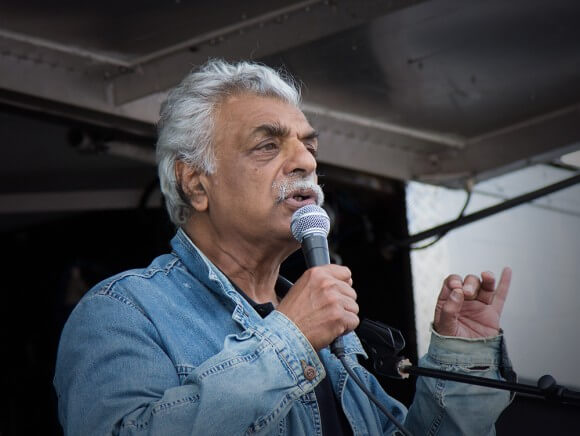
Tariq Ali, writer and journalist: “There is a basic point that has to be made to our politicians. They have to understand that there is no equivalence between the Palestinian resistance and the Israeli occupation. When a country is occupied, resistance emerges. If you want no rockets being fired, no tunnels being dug, get out of Gaza.” (Description: Palestine Solidarity Campaign )
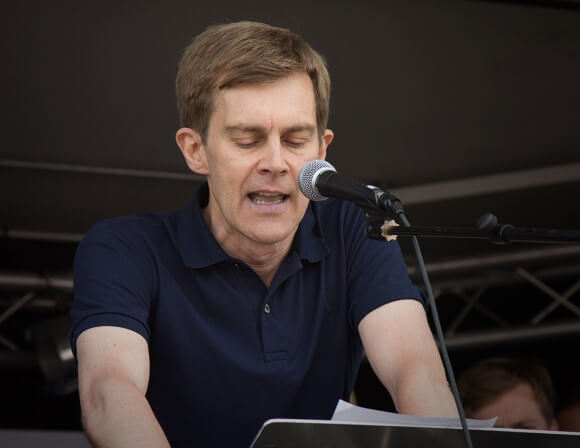
Seumas Milne, Guardian columnist and associate editor: “Israel is in illegal occupation of Gaza, the West Bank and East Jerusalem. Israel has no right to defend itself from territories it occupies. It only has an obligation to withdraw. The Palestinians are an occupied people. They have a right to defend themselves from the occupier.” (Description: Palestine Solidarity Campaign)
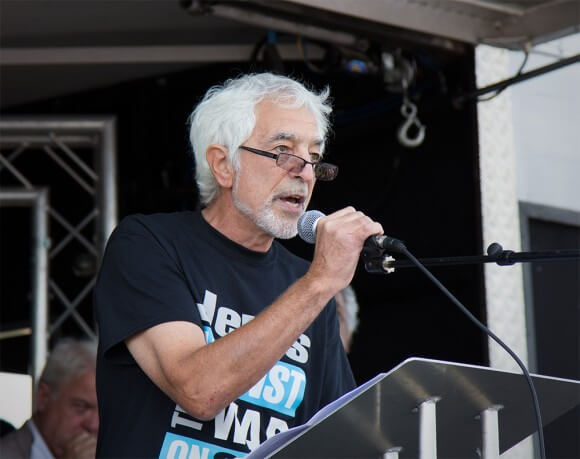
Glyn Secker, Jews for Justice for Palestinians: “Today, an image remains in my mind. It is the image of a Palestinian father carrying the flesh of his son in a plastic bag. As a Jew, I will not ever be associated with these monstrosities. Never in my name, never in my life, never in my children’s life.” (Description: Palestine Solidarity Campaign)
Going back and reviewing the events of last month, one can quickly see how the Israeli war on the people of Gaza has moved so many -especially from parliament- to speak out. The two major demonstrations that took place in London last month were on the 19th and the 26th, respectively. Between the two, the IDF massacred 558 people. The enormity of this figure sustained the demonstrators, and forced even more people to act. On the 26th, 100,000 people occupied Parliament Square calling for an arms embargo.
On the 29th, a vigil was held in front of 10 Downing street. Flowers were laid, accompanied by letters written in memory of the children killed in Gaza.
On that same day, over 100 Palestinians had been killed.
On the following day, the Jabaliya Elementary Girls School was attacked killing 21 of the homeless who had sought refuge within its walls. This attack and others, brought thousands to the Israeli embassy in Kensington on the 1st of August. The IDF responded to the global outrage by attacking another UN school on the 3rd, killing 11 people, five of whom were children between the ages of 3 and 15.
This was the final straw for many, including Baroness Warsi, who handed in her resignation on the 5th. Understandable: only the day before, David Cameron had refused to endorse Ban Ki-moon’s view that the attack on the UNRWA school was in violation of international law, saying: “I’m not an international lawyer.”
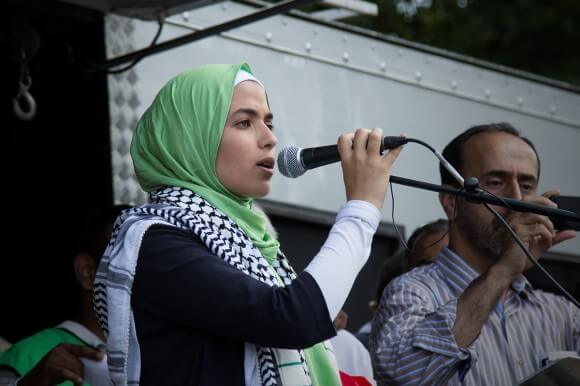
Ola, a Palestinian whose family’s home was bombed in Gaza, said in her speech:
“This is a regime that was built on massacres and murders. They said of the Palestinians that the old would die and the young would forget. Well, I am a young Palestinian, and I have not forgotten.” July 26, 2014 (Description: Palestine Solidarity Campaign)

Musician Brian Eno said, when he visited the West Bank, it was “the little things” that made him realise the scale of Israel’s occupation. “It was things like the whole village that had been evacuated and was living in caves so that three Israeli settler families could take their land and be protected by the army.” July 26, 2014 (Description: Palestine Solidarity Campaign)
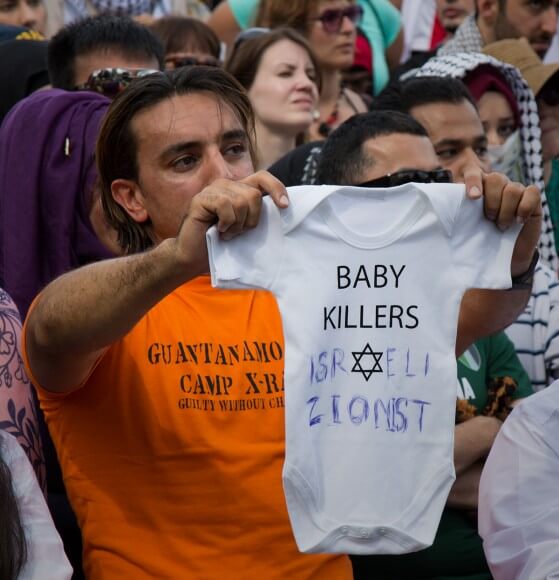
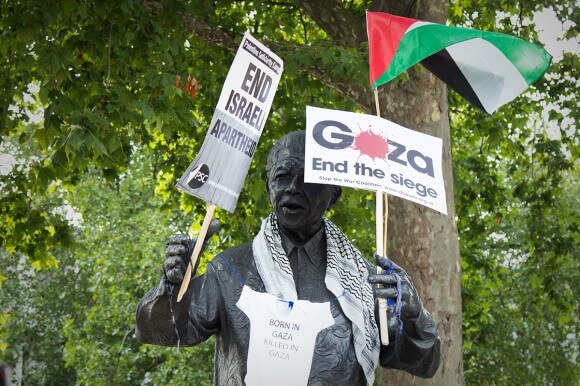
Protesters invoked the memory of Nelson Mandela. Seen in the photo, is the statue of Nelson Mandela in Parliament Square, appropriated for the occasion. July 26.
Hugh Lanning, Chair of Palestine Solidarity Campaign, at the vigil on the 29 of July. (Photo: Palestine Solidarity Campaign)
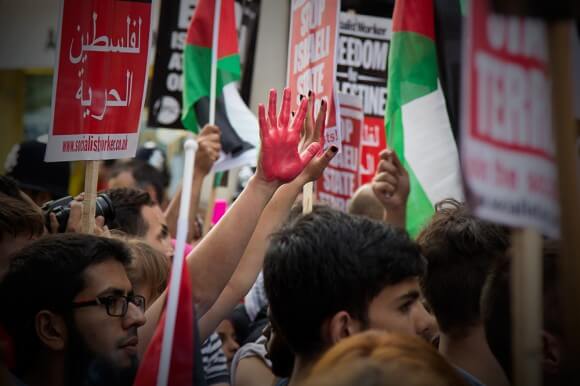
In a symbolic gesture, a demonstrator raised the palms of her hands, painted in red, toward the Israeli Embassy in London.
As the involvement of people in Britain with the solidarity campaign increases, the controversy over the BBC’s representation of the conflict, is likely to increase also. A question of fairness has been put many times before on this issue; mainly: are the serious criticisms being leveled at the BBC -pro-Israel bias and distortion by emission of context, etc- proportionate to its coverage over the years? To answer this justly, a detailed study is required: one that looks at the entirety of what the BBC has produced on the issue over the years. Such a study was commissioned by the BBC back in 2006, and it concluded that the BBC’s reporting on the Palestine-Israel conflict was “incomplete” and “misleading,” highlighting a “failure to convey adequately the disparity in the Israeli and Palestinian experience, reflecting the fact that one side is in control and the other lives under occupation.”
Other studies have reached similar conclusions, differing only in the severity of their indigments. Among them is the revealing study conducted by the renowned Glasgow Media Group; their findings were published as a book entitled Bad News From Israel. Author, professor Greg Philo, has dismissed much of the TV news on the issue as propaganda, “straight from the Israel Project.”
The main issue highlighted by the study is the context within which Israeli attacks are consistently framed. The argument is that once you’ve framed the event as a “response to Hamas rockets,” it won’t matter how much death and pain the viewers see on their screens; in their minds it becomes justified “retaliation,” excessive at worst, but justified nonetheless.
Some individual reporters, have attempted to inform the viewer of the larger context of oppression suffered by the people in Gaza, and not just the immediate results of “retaliations.” An example of this can be found in Jon Donnison’s report from Shujayea:
“…people in Gaza have had to rebuild so many times. They’ve seen half a dozen wars, and decades of Israel’s occupation. Much of the money for reconstruction will be foreign aid, some of it American. Who also provided Israel with the weapons to do much of this. But this will not be a lasting peace. In few years time, there’s no guarantee that it won’t all just happen again. Gaza has been crippled. The healing will take years. Many, will never recover.” (BBC News at One, August 5, 2014)
Judging by the BBC’s coverage of Gaza these last few weeks, it’s clear that the failure is rooted, and the problems run very deep. The previous criticisms made by credible studies have been dismissed. The reporting this time round is in many ways worse than it was during the previous Israeli wars on Gaza. The message to the BBC couldn’t have been clearer than it was on Saturday, and time will show whether the institution is capable of reform when it comes to covering Israeli occupation.


No Palestine or Gaza related item on BBC teletext news service as I write. We’ll see how things go from here.
I note the prominence given to the Mandela statue. Still, Mandela managed to spread something of a mist over his views of Zionism: he was not unequivocally on ‘our’ side. He never brandished the placards put into his statue’s hands.
I personally followed the media very closely during the current war in Gaza.
I followed Ynet, Haaretz, Alarabiya, Aljazeera, Daily Star, CNN and BBC.
In my honest opinion, the BBC were the fairest of the lot.
The real upsetting truth is that none of the above, and probably none of the other international media is really concerned with journalistic truth. Each presents the truth as they want it to be told.
Thank god for the internet…
I have not seen the US media cover any of the protests world wide or in the US.
I may have missed it.
Here is Cornell West making a speech at a protest for the war crimes against Gaza in Washington DC, he calls Obama and Bibi, war criminals:
http://electronicintifada.net/blogs/nader-ihmoud/video-obama-and-netanyahu-are-war-criminals-says-dr-cornel-west-washington
The zionist controlled MSM & their so-called journalists…have sidelined and tucked away the massacres…the genocide…of Gaza by Israel’s criminal IDF…
Their present main narratives now… seem to be Iraq…and other little stories. And the nearly 2,000 dead Palestinians in Gaza, West Bank…over the last month long…deceptively tucked away!
Its change the topic maneuver!!!
I am curious why you say this “managed to spread something of a mist over his views of Zionism”?
To my mind, Nelson Mandela seemed very supportive and vocal on the rights of Palestinians even when bullied by the likes of Bill Clinton to relinquish his relationship with Arafat…